
© Agency for Cultural Affairs, Japan, 2021
The UNESCO Chairs and UNITWIN Networks is a network of universities around the world that supports UNESCO’s work. Chairs and UNITWIN Networks are important examples of tertiary education networking. They bring together partners in academia, civil society, communities and policy-making stakeholders while promoting north-south and south-south cooperation.
Chairs and networks dedicated to living heritage contribute to the training of future planners, managers and decision-makers in the field of living heritage safeguarding. They contribute to deepening the reflection on the topic and provide knowledge and advice from academia on the implementation of the Convention at the national and international levels.
There are to date 18 UNESCO Chairs and UNITWIN Networks linked to living heritage safeguarding and the 2003 Convention in different regions of the world. Their fields of action encompass conducting research and seminars on intangible cultural heritage, developing codes of ethics in safeguarding, raising awareness on intangible cultural heritage and its importance, studying and raising awareness on the contribution of living heritage safeguarding to sustainable development, and more.
Learn more about the UNESCO Chairs and UNITWIN Networks linked to living heritage safeguarding and the 2003 Convention:
- UNESCO “Ashiq Shamshir” Chair in Folk Music Heritage and Storytelling Traditions (ANAS)
- UNESCO Chair on Anthropology of Traditional Music: Representing and Repositioning Intangible Cultural Heritage
- UNESCO Chair on Applied Studies of Intangible Cultural Heritage
- UNESCO Chair in Carnival and Heritage
- UNESCO Chair on Critical Heritage Studies and Safeguarding Intangible Cultural Heritage
- UNESCO Chair on Intangible Cultural Heritage and Comparative Law
- UNESCO-UNITWIN Chair on Intangible Cultural Heritage and Cultural Diversity
- UNESCO Chair in Intangible Cultural Heritage in Formal and Informal Education
- UNESCO Chair on Intangible Cultural Heritage Policy and Law
- UNESCO Chair on Intangible Cultural Heritage in Public and Global Governance
- UNESCO Chair on Intangible Cultural Heritage and Sustainable Development
- UNESCO Chair in Intangible Cultural Heritage and Traditional Know-How: Linking Heritage
- UNESCO Chair on Living Heritage and Community Development
- UNESCO Chair on Living Heritage and Sustainable Livelihoods
- UNESCO Chair in Transcultural Music Studies
- UNESCO Chair for the Transmission of First Peoples’ Culture to Foster Well-Being and Empowerment
- UNESCO Chair on World Traditional Handicrafts: Inheritance and Innovation
- UNITWIN Network on Intangible Cultural Heritage in Latin America and the Caribbean
- UNITWIN Network on Bantuphonie: Endangered languages, endogenous knowledge and biodiversity
UNESCO “Ashiq Shamshir” Chair in Folk Music Heritage and Storytelling Traditions (ANAS)
The UNESCO “Ashiq Shamshir” Chair in Folk Music Heritage and Storytelling Traditions is hosted at the Azerbaijan National Academy of Sciences Institute of Folklore (ANAS). It was established in 2020. Its main aims are to promote understanding on the transmission of musical practices and storytelling traditions among youth and communities, and to encourage networking and collaboration among researchers and institutions in fields related to music as a living heritage. With a multidisciplinary approach, it contributes to improving and disseminating good practices related to oral expressions and performing arts.
- Year of creation: 2020
- Chairperson: Prof. Mukhtar Imanov, ANAS Institute of Folklore, Azerbaijan
- See the website
.jpg)
UNESCO Chair on Anthropology of Traditional Music: Representing and Repositioning Intangible Cultural Heritage
The Chair aims to map down and reassess the domain of intangible cultural heritage with an anthropological focus on traditional music. It intends to advance multidisciplinary research, analysis, policy, and strategic narrative regarding music as living heritage via three main objectives: to showcase the domain of representing musical heritage through distinguishing between actually lived culture and invented tradition; to safeguard longstanding cultural practices and traditional music in particular against state policies about culture and to propose a new balance between musical heritage and institutional management of traditional culture.
- Year of creation: 2023
- Chairperson: Prof. Pavlos Kavouras, National and Kapodistrian University of Athens, Greece
- See the website
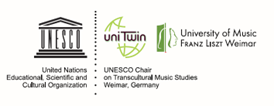
UNESCO Chair on Applied Studies of Intangible Cultural Heritage
The UNESCO Chair on Applied Studies of Intangible Cultural Heritage trains students for work in the dynamic field of intangible cultural heritage, conducts research to find novel results/interpretations and engages actors in the field to share their experience while learning from the state-of-the-art scholarly exchange. Topics addressed by the Chair include community action, ownership, livelihoods, food culture, small businesses, tourism, rural settlements, environmentally sustainable practices and traditional medicine.
- Year of creation: 2019
- Chairperson: Dr Elo-Hanna Seljamaa, University of Tartu, Estonia
- See the website

UNESCO Chair in Carnival and Heritage
The purpose of the UNESCO Chair in Carnival and Heritage is to promote an integrated system of research, training, information and documentation regarding inventories and safeguarding techniques for carnival as cultural intangible heritage. It facilitates collaboration between high-level, internationally recognized researchers and teaching staff of the University and other institutions in Uruguay and in Latin America and the Caribbean, as well as in other regions of the world. Specifically, it aims at systematizing research on carnival and heritage from an interdisciplinary perspective, study the economic and sociological impact of carnival, design public policies and enhance capacity-building and networking.
- Year of creation: 2012
- Chairperson: Mr. Rodrigo Anim, Universidad de la República, Montevideo, Uruguay
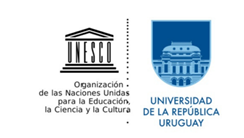
UNESCO Chair on Critical Heritage Studies and Safeguarding Intangible Cultural Heritage
The UNESCO Chair on Critical Heritage Studies and Safeguarding Intangible Cultural Heritage is hosted at the Vrije Universiteit Brussel (VIB). It explores the effects of the implementation of the 2003 Convention and its Operational Directives building on the global movement of critical heritage studies. It aims at promoting sustainable development in terms of ecology, economy, social issues and culture, via cultural heritage and safeguarding intangible cultural heritage in particular. It contributes to the evaluation and reframing of the standard-setting instruments of UNESCO and to linking science, inclusive policies and society.
- Year of creation: 2014
- Chairperson: Prof. Marc Jacobs, Vrije Universiteit Brussel, Belgium
- See the website

UNESCO Chair on Intangible Cultural Heritage and Comparative Law
The UNESCO Chair on Intangible Cultural Heritage and Comparative Law aims at studying the main legal instruments and the most significant examples of legal protection of intangible cultural heritage using multidisciplinary and comparative analyses aimed at the countries of the Mediterranean and Latin America. It is set to of achieve global awareness of living heritage on the part of academia and public institutions, consolidating a virtuous dynamic between the global North and South and stimulating the sharing of good practices for the achievement of sustainable development goals.
- Year of creation: 2019
- Chairperson: Prof. Pier Luigi Petrillo, University of Rome Unitelma Sapienza, Rome, Italy
- See the website

UNESCO-UNITWIN Chair on Intangible Cultural Heritage and Cultural Diversity
The UNESCO Chair on Intangible Cultural Heritage and Cultural Diversity develops concepts and methodologies to establish inventories and safeguarding techniques for intangible cultural heritage in local communities in culturally diverse social contexts. This includes field studies, methodology development and capacity building among researchers. Advances made in developing such methodologies and strategies are disseminated through and discussed in cooperation with national institutions, academic centers and international networks, especially in developing countries. Specific strategies are also developed and discussed with other relevant cultural foundations, NGOs and private sector organizations.
- Year of creation: 2011
- Chairperson: Dr. Cristina Amescua Chávez, Universidad Nacional Autónoma de México (UNAM), Mexico
- See the website
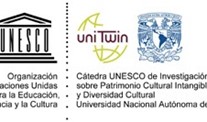
UNESCO Chair in Intangible Cultural Heritage in Formal and Informal Education
The UNESCO Chair in in Intangible Cultural Heritage in Formal and Informal Education promotes the sharing of knowledge in the field of intangible cultural heritage in education, focusing on researchers, students, local authorities. As the only UNESCO Chair in the field of ICH in Türkiye, it works to set the agenda for conceptual and applied activities, including providing academic support for the planning and execution of activities, or contributing to the intergenerational transmission of knowledge and skills through jointly organized hands-on activities and workshops.
- Year of creation: 2017
- Chairperson: Prof. Ahmet Erman Aral, Ankara Hacı Bayram Veli University, Ankara, Türkiye
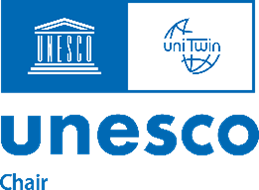
UNESCO Chair on Intangible Cultural Heritage Policy and Law
The UNESCO Chair on Intangible Cultural Heritage Policy and Law aims at developing post-graduate courses and research projects that explore the implementation of the UNESCO 2003 Convention in international cooperation as well as at the national level in various countries. It focuses on the analysis of experiences, challenges, and solutions for connecting various fields of policymaking and legislation in relation to living heritage.
- Year of creation: 2017
- Chairperson: Dr. Anita Vaivade, The Latvian Academy of Culture, Riga, Latvia
- See the website

UNESCO Chair on Intangible Cultural Heritage in Public and Global Governance
The UNESCO Chair on Intangible Cultural Heritage in Public and Global Governance aims to reflect on the question of what is considered – under what conditions and by whom – as constituting effective, ethical and sustainable governance of Intangible Cultural Heritage. Its interdisciplinary team investigates fundamental questions such as: how should a given community – including international community – govern heritage resources? When are heritage resources considered to be public goods or the commons – and when are they not? What are the criteria for effective and ethical heritage governance? What will be the most appropriate tools and methodologies to address these issues, including those stemming from artificial intelligence? Examination of the challenges and opportunities surrounding the public and global governance of intangible cultural heritage, contextualized within frameworks such as the MONDIACULT 2022 Declaration, the Agenda 2030, UNESCO Medium-Term Strategy for 2022-2029 and recommendation on Ethics in AI will be a key focus.
- Year of creation: 2024
- Chairperson: Prof. Hanna Schreiber, University of Warsaw, Poland
- See the website

UNESCO Chair on Intangible Cultural Heritage and Sustainable Development
The UNESCO Chair on Intangible Cultural Heritage and Sustainable Development at CY Cergy Paris Université studies the performative power of the association of sustainable development and intangible cultural heritage. On the one hand, it explores how living heritage can, or cannot, promote more equitable economic and social models and more responsible ways of interacting with the environment. On the other, it looks at how sustainability objectives transform our ways of imagining cultural transmission and attributing heritage value to practices, representations, expressions, knowledge and know-how. The Chair aims to understand what living heritage does to sustainable development and, conversely, what sustainable development does to living heritage.
- Year of creation: 2021
- Chairperson: Prof. Bortolotto, CY Cergy Paris Université, France
- See the website

UNESCO Chair in Intangible Cultural Heritage and Traditional Know-How: Linking Heritage
The UNESCO Chair in Intangible Cultural Heritage and Traditional Know-How: Linking Heritage fosters the protection and conservation of heritage in all its forms – tangible and intangible, cultural and natural, movable and immovable – and aims to strengthen heritage conservation and capacity-building, particularly in Africa, Small Island Developing States (SIDS) and Least Developed Countries (LDCs), but also in the Mediterranean region. It works to attain results in line with the objectives of UNESCO: to achieve a coordinated approach to the various dimensions of heritage’s protection and safeguarding and to improve them, guided by the sustainable development goals.
- Year of creation: 2013
- Chairperson: Prof. Maria Filomena Gonçalves, University of Évora, Portugal
- See the website
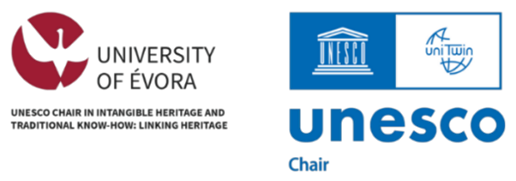
UNESCO Chair on Living Heritage and Community Development
The UNESCO Chair on Living Heritage and Community Development is set to promote an integrated system of research, teaching and training, as well as community engagement and communication. It facilitates collaboration between high-level, internationally recognized researchers and teaching staff of Fudan University and other institutions in the country, as well as elsewhere in the region and in other regions of the world. It aims specifically at enhancing the understanding, protection, and creative utilization of living heritage for community development, ensuring inclusive and equitable heritage education and learning opportunities for community members in China’s less developed areas and other developing countries.
- Year of creation: 2022
- Chairperson: Prof. Xiaofan Du, Fudan University, Shanghai, China
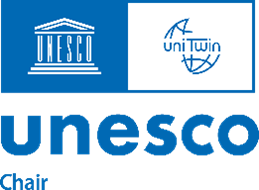
UNESCO Chair on Living Heritage and Sustainable Livelihoods
The UNESCO Chair on Living Heritage and Sustainable Livelihoods is hosted at the University of British Columbia (UNBC). It promotes an integrated system of research, teaching and training, community engagement and communication in the living heritage and ICH-sourced livelihoods. It aims at facilitating collaboration between organizations working in ICH and internationally recognized researchers and practitioners in Canada and around the world. The overarching goal of the Chair is to catalyze the need for ICH recognition and actuate the recommendations made by its partner organizations, including indigenous communities, as well as respond to the recommendations outlined in the Royal Commission on Aboriginal Peoples (RCAP) and the Truth and Reconcilication’s Calls to Action.
- Year of creation: 2022
- Chairperson: Prof. Agnieszka Pawlowska-Mainville, Prof. Kristin Catherwood, University of Northern British Columbia, Canada
- See the website

UNESCO Chair in Transcultural Music Studies
The UNESCO Chair in Transcultural Music Studies (TMS) is dedicated to music and its study from a cultural studies perspective. Music as a living, intangible cultural heritage as defined by UNESCO is here for the first time an integral part of the professional orientation of a musicology chair. The Chair studies music-making and its reception in a broader social and cultural context. The music research, which is oriented towards cultural theory and anthropology, is concerned not only with documentation, analysis and mediation, but also with emphatically application-oriented approaches based on international research and exchange projects.
- Year of creation: 2016
- Chairperson: Dr. Tiago de Oliveira Pinto, University of Music Franz Liszt Weimar, Germany
- See the website

UNESCO Chair for the Transmission of First Peoples’ Culture to Foster Well-Being and Empowerment
The UNESCO Chair for the Transmission of First Peoples’ Culture to Foster Well-Being and Empowerment is a project of the Université du Québec à Chicoutimi, in Canada. Its mission is to promote and participate in an integrated system of research, training, knowledge transfer and documentation in the fields of education, wellness and culture among First Nations and Inuit. It facilitates collaboration among cultural experts, Indigenous knowledge-holders and top researchers from universities and institutions of higher education in Quebec, Canada, the Americas and the world.
- Year of creation: 2018
- Chairperson: Prof. Étienne Roy-Grégoire, Université du Québec à Chicoutimi, Canada
- See the website

UNESCO Chair on World Traditional Handicrafts: Inheritance and Innovation
The UNESCO Chair on World Traditional Handicrafts: Inheritance and Innovation aims at becoming a centre for international academic exchange and cooperation with regard to traditional handicrafts, strengthening entrepreneurship skills of traditional handicraft inheritors through specialized training programmes, building a database of inheritors and proponents of traditional handicrafts and promoting the values related to traditional handicrafts through educational programmes.
- Year of creation: 2022
- Chairperson: Prof. Chen Ping, Prof. Wang Zhong, Jinan University, Guangzhou, China
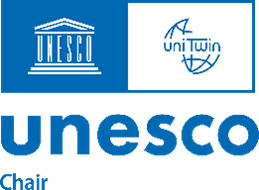
UNITWIN Network on Intangible Cultural Heritage in Latin America and the Caribbean
The UNITWIN Network on Intangible Cultural Heritage in Latin America and the Caribbean aims to promote a set of integrated research, training, information and documentation activities within the scope of the 2003 Convention. This includes the development of curricula and academic research that contribute to raising awareness of the importance of intangible cultural heritage and its safeguarding, building spaces for training and strengthening the knowledge of actors, government institutions, civil society and the communities that work for the safeguarding of living heritage in the Latin American and Caribbean region.
- Year of creation: 2022
- Chairperson: Dr. Leticia Marrone, Universidad Nacional de Avellaneda, Buenos Aires, Argentina
- Network universities: Universidad Nacional de Avellaneda (Argentina), Universidad Nacional de Rosario (Argentina), Universidad Nacional de Asunción (Paraguay), Universidad de la República (Uruguay)
- See the website

UNITWIN Network on Bantuphonie: Endangered languages, endogenous knowledge and biodiversity
The UNITWIN Network on Bantuphonie: Endangered languages, endogenous knowledge and biodiversity aims to promote and safeguard Bantu intangible heritage. To this aim, it pools the knowledge developed in different countries of Bantu languages and cultures to offer training courses in Central Africa aimed at safeguarding the intangible cultural heritage associated with Bantu languages. It offers practical tools to help safeguard this heritage and preserve biodiversity, trains specialists in intercultural mediation and in Bantu heritage and supports student mobility, knowledge exchange and dissemination.
- Year of creation: 2018
- Chairperson: Prof. Patrick Mouguiama-Daouda, Université Omar Bongo, Gabon
- Network universities: Université Omar Bongo (Gabon), Marien-Ngouabi University (Republic of the Coongo), University of Yaoundé I (Cameroon), Université Lumière Lyon 2 (France)
- See the website
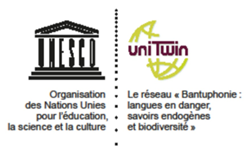
See also:
- UNESCO Chairs and UNITWIN Networks
- Global tertiary education networking
- UNESCO Category 2 centres
- UNESCO Clearinghouse on living heritage and education
- Research references on the implementation of the 2003 Convention
UNESCO plans to continue to build on this work. For further information, please contact ICH-capacity@unesco.org